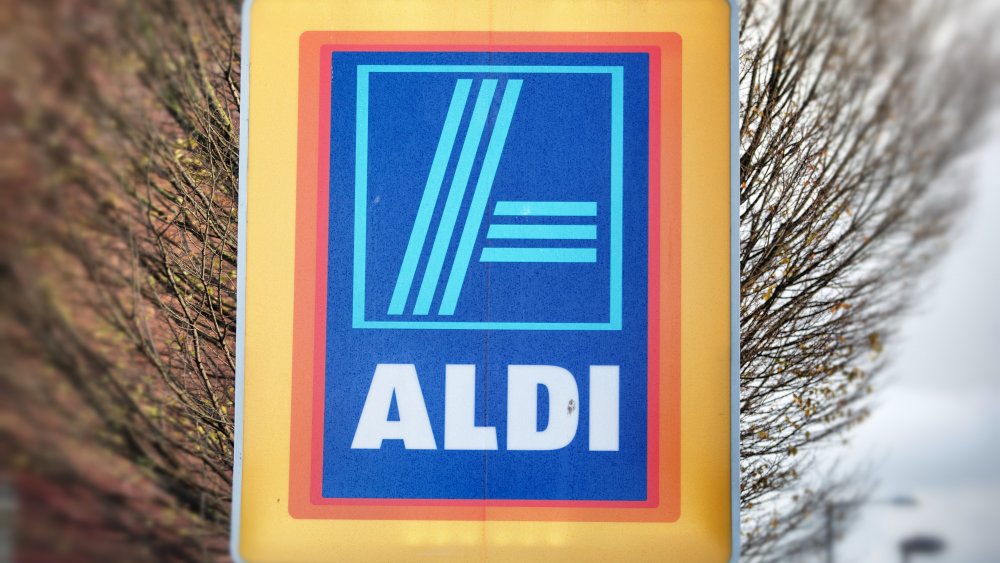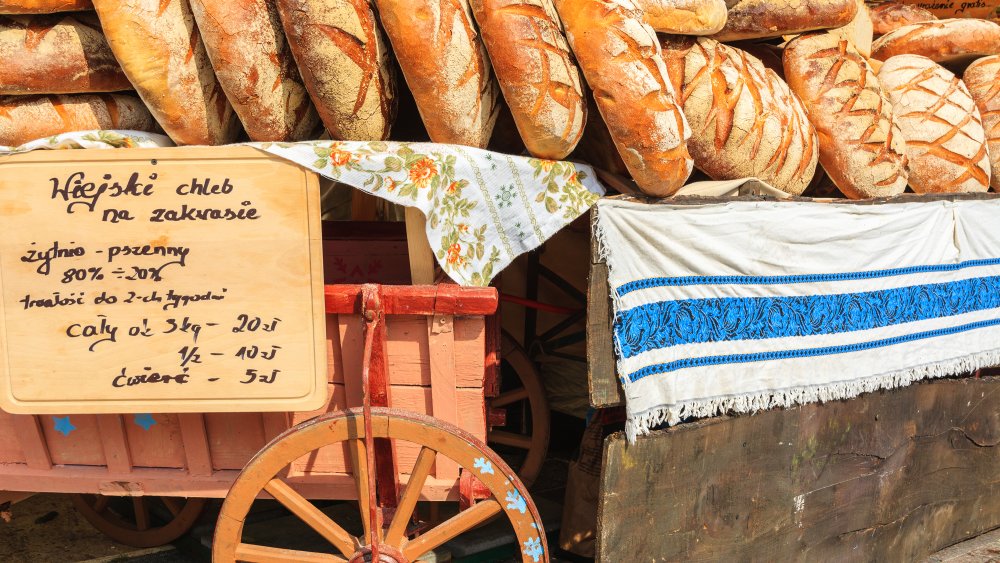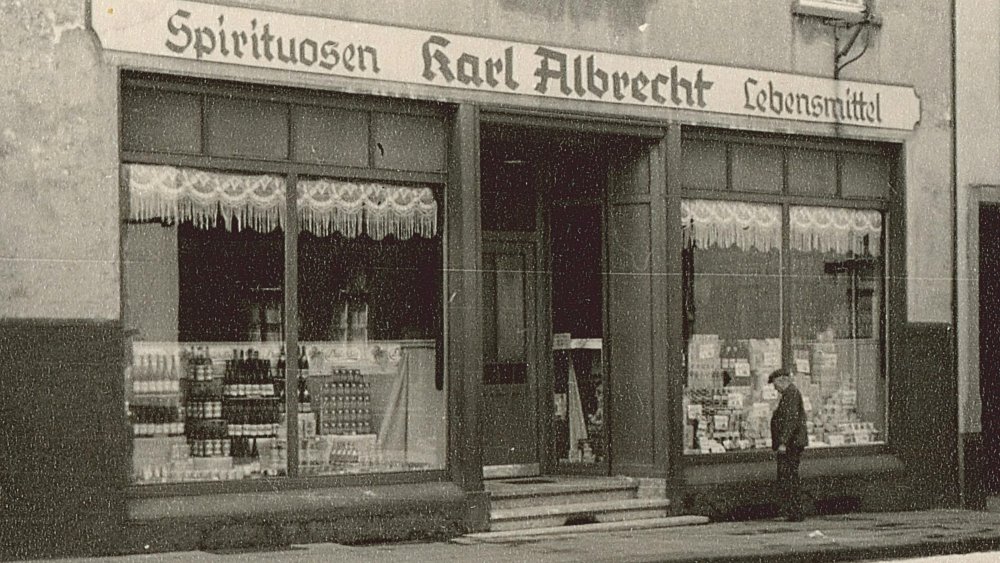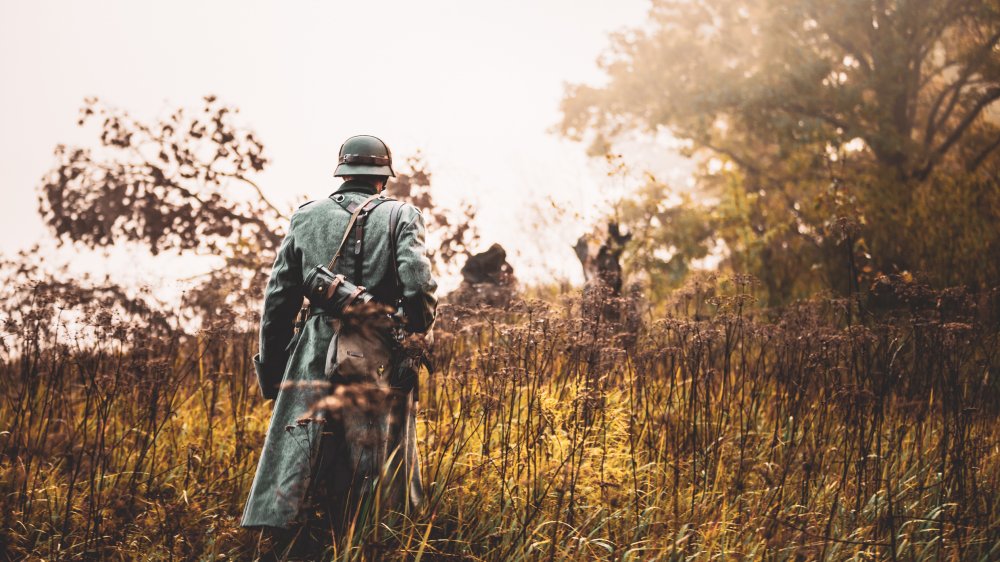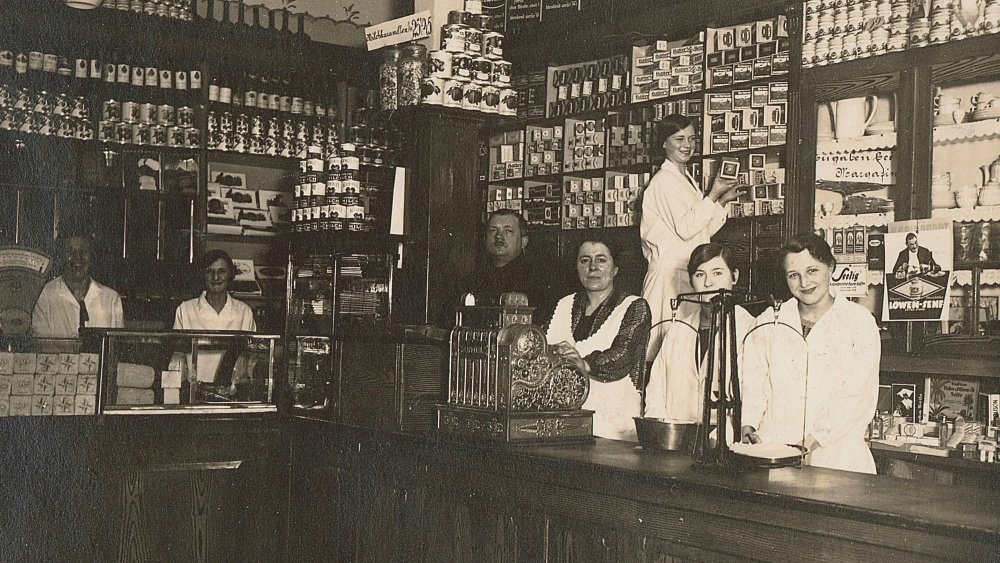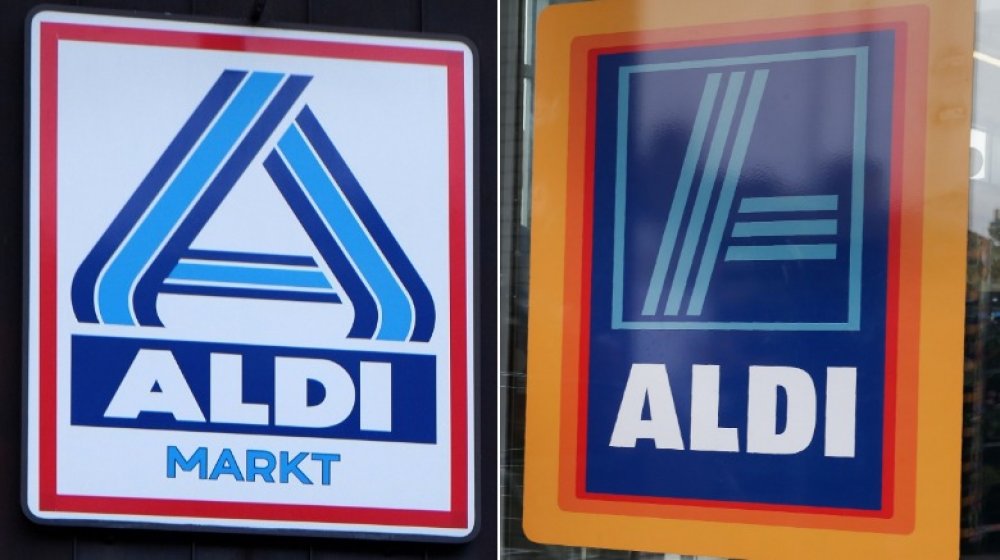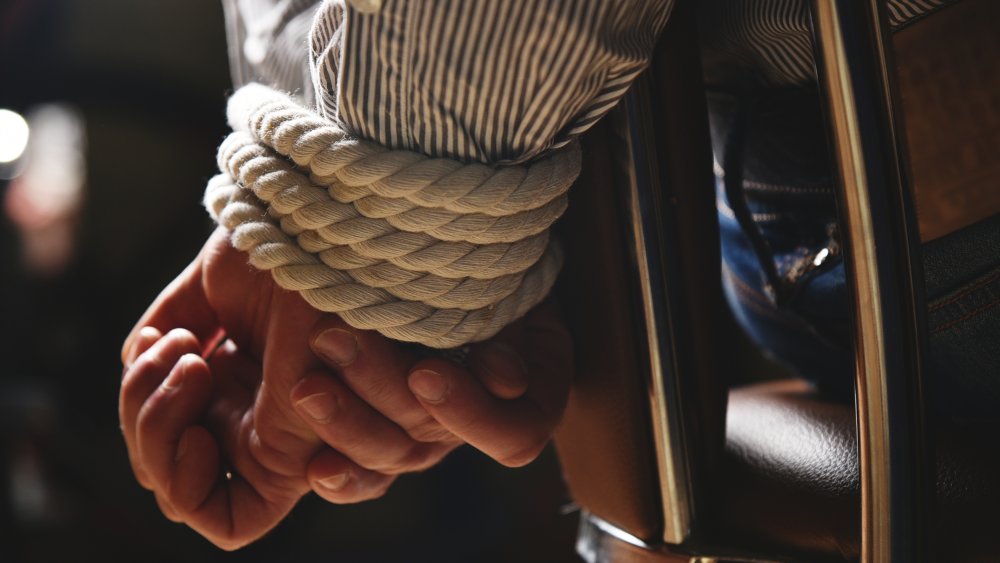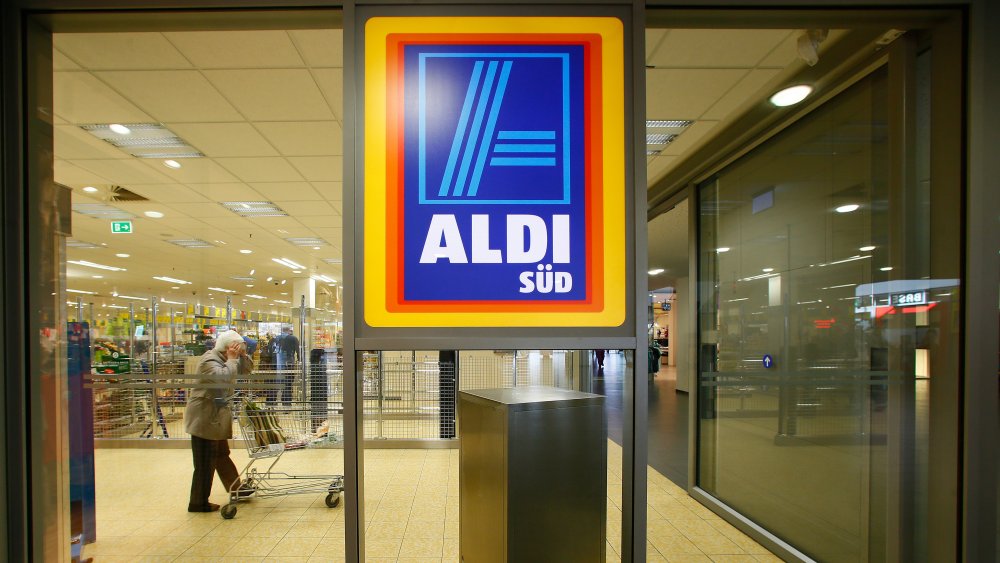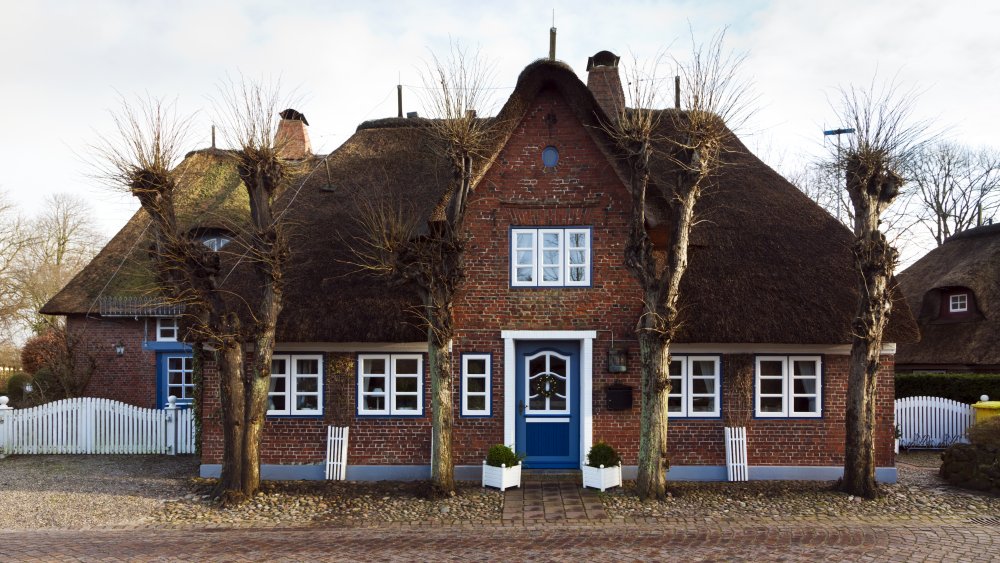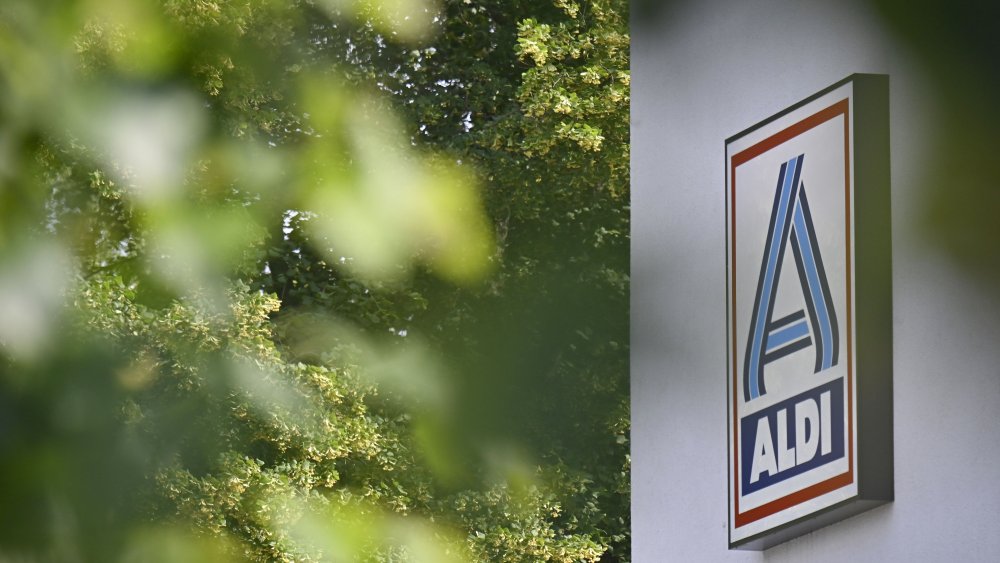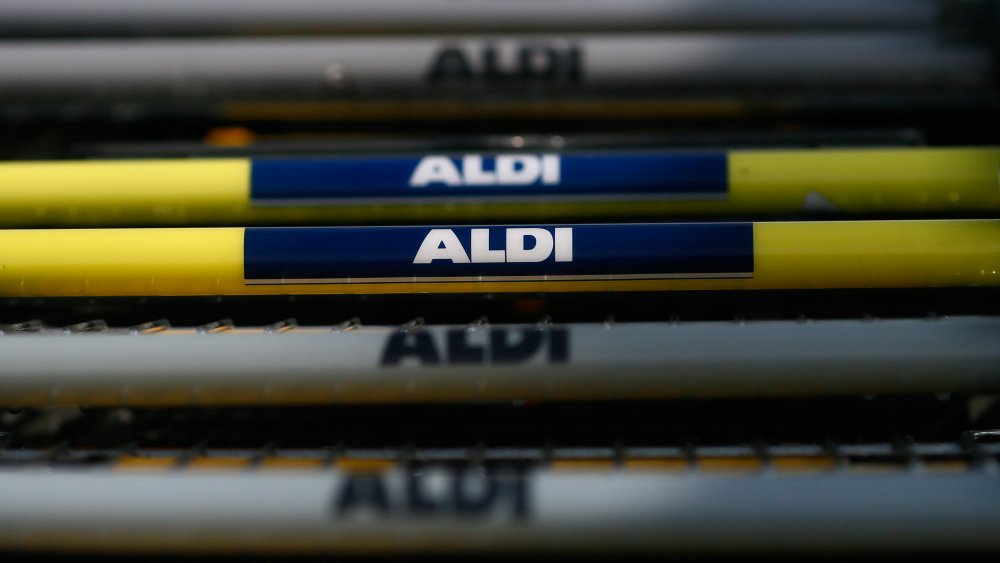The Untold Truth Of The Brothers Who Started Aldi
Just a few decades after they opened, Aldi had grown from a discount store on a German streetcorner to be one of the largest supermarket chains in the world. As of 2019, Aldi Sud (which is in countries like the US, Italy, the UK, Ireland, and Australia) has 6,322 locations, employs nearly 150,000 people, and boasted an annual revenue of $19.3 billion. Sister company Aldi Nord (which is found in France, Poland, the Netherlands, and in the US as Trader Joe's, among other countries), has an impressive 4,690 locations, around 60,000 employees, and around $14.5 billion in annual revenue — though those numbers don't reflect Trader Joe's locations).
It's no wonder — Aldi is amazing.
The low-cost, high-quality grocer with minimal selection and a strange section of ever-changing wonders was the brainchild of two brothers: Theo and Karl Albrecht. These super-secretive billionaires started from the most humble of humble beginnings, and piecing together the scant details of their lives is difficult. Few photos of them exist and few interviews were given, making the information we can piece together about their lives that much more fascinating.
The Aldi brothers' humble beginnings
Karl Hans Albrecht was born on February 20, 1920. Younger brother Theodor Paul Albrecht followed on March 28, 1922, and the two brothers from Essen, Germany would go from incredibly humble beginnings to the head of Aldi, a multi-billion-dollar empire.
When The New York Times reported on Karl's death in 2014, they also reported on how they had gotten their start in the grocery business: pulling a wooden wagon along the streets of Essen and selling buns. Their neighborhood, Schonnebeck, is one that Spiegel Online described as a working-class area, run-down and populated by people who were less than well-to-do.
The widely accepted story is that the brothers' father, also named Karl, was a miner who was forced from his livelihood after contracting black lung. He began running a small, corner store instead, but according to the third-generation Karl Albrecht, that's not true.
He says that his grandfather wasn't a miner, but a baker's apprentice. Until, that is, he gave up the trade to get involved in running a storefront, a business his wife took over when he was drafted in 1914. In a rare interview with the German-language newspaper Franffurter Allgemeine, Karl (the Aldi co-founder) described himself as "lucky." Not only did he survive tuberculosis and a brush with death at age 5, he also credited his mother for getting them into the business at a young age and showing them what it took to run a successful store.
The original Aldi
The original Aldi looked very different than today's stores. It was a small shop of only about 1,000 square feet, located on the ground floor of a four-story brick rowhouse (via Spiegel Online). The Albrechts lived above the shop, and making ends meet wasn't easy.
When Karl spoke to Franffurter Allgemeine, he said it was the ever-growing presence of competition that made the business most difficult, and also made him realize just what he needed to do to compete. Chain stores were luring customers away with low prices, and they knew that if they wanted to advance in the world — and they did — they were going to have to win those customers back. And there was never a doubt they'd get into the grocery store business. Karl said, "I would have done something else, but I recognized as a child that you can grow up as a grocer even in times of crisis."
They were always on the front lines of the business, and at the time they were embarking on building their empire, it was as if Aldi was simply meant to be. Karl said in a rare interview, "I always believed in my ideas, and consistently implemented them. It was so clear, so simple, anyone could have done it."
World War II had a big impact on the Aldi brothers
During World War II, Essen was a prime target for Allied bombing runs, mostly because it was the home of Krupp armaments, a major supplier of steel and weapons to the Nazi war machine (via DW). The New York Times says more than 200 bombing missions were run over Essen, and somehow, the Albrecht's little grocery store was spared.
Both brothers were drafted into that same war machine, and both spent much of the war in Allied prisoner-of-war camps. Aldi co-founder Theo had been sent to fight under Rommel in the Afrika Korps, and sources vary on whether he was captured in Italy or Tunisia. HIs brother Karl was drafted into the Wehrmacht, the armed forces of the Third Reich, and was sent to the Russian front. After only a few months he suffered a wound that nearly required the amputation of his leg, then later survived capture and a weeks-long march across the Eastern Front; many of his fellow soldiers, says Franffurter Allgemeine, were either shot or sent back to the front.
After they were released from the POW camps, the Aldi brothers returned to their hometown and the family store. Five years after the brothers took over their little grocery store, they had already grown to have 31 branches. Two years after that, they had expanded to more than 300 Aldi locations.
The Aldi brothers were inspired by post-war frugality
Life in post-war Germany was difficult, and shaped the way the brothers did business. They had little money themselves, and The Guardian says that when they were able to re-open their family store, they could only afford to offer basic, staple items like noodles, pasta, and soap. Almost accidentally, they had stumbled on a brilliant business model: offer the basics at a cheap price point, and people will come. They started cutting costs and waste right from the beginning, and that included cutting out what had been a common sight in grocery stores until then: the counter clerk. For a long time, people would come into the store, tell the clerk what they wanted, and have their order filled. The Albrecht brothers picked up on the American tradition of self-service, and that allowed them to cut costs even more. This is a practice that Aldi still uses today by having customers bag their own groceries.
According to CNBC, their low-cost, no-frills approach earned them something of a cult following (kind of like what they have today), and they were so popular that they opened four more Aldi stores by 1948. Those early stores, says Franffurter Allgemeine, were about the size of a dorm room, and each one maintained the same bare-bones look they're still known for today.
Aldi North vs. Aldi South
Aldi changed in 1961, and it changed because of the same reason many families change: a dispute between brothers.
According to The Guardian, it all came down to whether or not they were going to sell cigarettes. Theo was in favor of adding them to Aldi's shelves, but Karl was 100 percent against it. He believed the move would attract and encourage shoplifting, and it proved to be a dealbreaker.
At the time, they had around Aldi 300 stores. They drew a line right through their hometown of Essen, and made that the "Aldi equator". Theo took over the stores in the north and Karl took the south, splitting the stores in an impressively amicable way. While the division led to stores that carried different products, had different logos, and were identified by different colors, they stayed on good terms. They even still partnered up to share information and even negotiate with suppliers, using their joint weight to get even better deals.
Aldi co-founder Theo was kidnapped and ransomed
In 1971, something shocking happened: Aldi co-founder Theo Albrecht became the victim of one of Germany's most high-profile kidnapping cases. According to The Guardian, he was held for 17 days — locked in a wardrobe in a house in Duesseldorf — until the kidnappers were paid a ransom of 7 million deutschmarks.
The kidnapping was strange: confused by Theo's ill-fitting suit, they insisted on seeing his ID before they took him captive. A bishop from their hometown acted as an intermediary, and Karl paid half the ransom — the largest ever paid at the time, amounting to nearly $2 million.
The kidnappers were eventually caught; the man nicknamed Diamond Paul was arrested after he was caught spending marked bills from the ransom money, and his partner (and lawyer) Heinz Joachim Ollenburg attempted to flee to Mexico, but was returned to Germany. They spent eight and a half years in prison and even after they got out, there was a long-running mystery about what happened to the ransom money. There were rumors that Ollenburg took the majority of it, other tales that it had been stashed in a Swiss bank, and it was a mystery that wasn't solved before both died in 2017.
The ordeal had a long-lasting impact on the already-private brothers, who largely retreated from public view following the incident. The last known picture of Theo taken with his consent was in 1971, and for decades afterwards, he guarded his privacy — and his family — very closely.
The Aldi brothers were notoriously reclusive
The Albrechts were always private, and after Theo's kidnapping they became even more reclusive. According to The Guardian, Theo not only refused to allow his photograph to be taken, but he travelled to and from his office in an armored car, insisting on taking a different route each day. Whenever travel necessitated staying in a hotel, he always made sure he had an escape route planned.
Karl, too, was intensely private, living in a home completely hidden behind a terrace wall. According to Spiegel, he had no use for showmanship and social gatherings; when one of his managers threw him a party for his 90th birthday, his speech was, in its entirety, this: "I did not want you all to come, I'm hungry and I'll go home soon."
There were a number of honors that various organizations had attempted to give the Aldi brothers, says The Local, and they were always turned down. When Essen wanted to honor their famous family by naming a street after them and giving their original location a historical designation, they fought it. They had no media presence, and Karl only made a single public statement regarding their company — and that was in 1953.
The Aldi brothers were notoriously frugal
There are a ton of stories attesting to the fact that the Albrecht brothers practiced the same frugality in their personal lives that they established in their Aldi stores. In spite of being worth billions, they had no holiday homes, no private jets or yachts, (via The Local), no chauffeurs, wore suits off-the-rack, and Theo's car of choice was the relatively modest Mercedes E-Class (via Spiegel). According to The Independent, Theo was notorious for using pencils right down to the nubs, and both brothers were known for insisting the lights be turned off if they didn't deem them absolutely necessary — they didn't want to waste electricity.
In 1997, the brothers bought plots in a municipal Essen cemetery. According to The Guardian, the plots stood unattended and overgrown for so long that the cemetery complained to them that something needed to be done. Eventually, Aldi trucks turned up with landscaping equipment, trees, and flowers. Why did it take so long? They had been waiting for the plants to go on sale at their store.
The Aldi brothers had completely different management styles
Karl's interview with the German-language newspaper Franffurter Allgemeine, given not long before his death, shed valuable light on the brothers that created one of the world's biggest grocery empires — and they couldn't have been more different.
Take their management styles. Theo harbored a constant suspicion about his workers, and he was known for not only being the first one in the office and the last one to leave, but for being involved with even the smallest details of running his business. Karl, on the other hand, made sure to hire people he trusted and to delegate. The result was that he was only needed in the office in the morning, and would spend his afternoons at home with his family. His door was always open, but every Tuesday morning he would head out onto the golf course, alone and undisturbed. It was important, he said; "I needed this time, this distance, even this peace. I was worried that I would lose track."
He loved architecture, and designed the layout of some of the Aldi stores himself. He was a regular at the Aldi nearest his home, and considered his regular trips to various Aldi stores "a lot of fun."
The few indulgences of the brothers who founded Aldi
According to The Irish Times, Karl Albrecht had this to say about money: "Wealth means little to me, unlike the freedom and independence that wealth brings with it." For all the brothers' frugality, there were some luxuries they indulged in — but even those had a practical side. Karl, for instance, was such an avid golfer that he decided the best thing to do was to just build his own golf course and hotel. That way, he wasn't paying club or greens fees.
When The Guardian published Theo's obituary, the list of hobbies and pastimes the brothers shared read much like anyone else's. They loved to play golf, they grew orchids, and they collected typewriters. And The National says they spent a good amount of their time — especially post-retirement from Aldi — living on a remote island in the North Sea. The island, Fohr, is a quiet, picturesque place once regularly visited by Hans Christian Andersen, and the brothers owned a cottage there (much like the traditional-style Fohr home pictured).
The retirements and deaths of the Aldi brothers
Theo passed away in 2010, and The Guardian reported that the 88-year-old entrepreneur had been suffering from a prolonged illness following a bad fall he'd taken at his home. He had stepped down from an official position at Aldi in 1993, but like his brother, he stayed active in the business and kept a watchful eye on how things were going. His obituary credited him as being the brother that was responsible for Aldi's reputation of tight cost control, no marketing, and no money spent on store decorations.
When Karl passed away in 2014, he was 94 years old, the second-richest person in Germany, and the 35th-richest in the world, says The Washington Post. At the time of his death, he hadn't been retired long at all — he only stepped down as the CEO of Aldi South in 1994, and gave up a position as chairman of the company in 2002.
The Aldi brothers were secretive contributors to charity
The Albrecht brothers had something else in common: they dedicated a huge portion of their fortune to charity... quietly. The brothers were, of course, as secretive about this part of their lives as they were about everything else, and it's only fairly recently that word of their charitable giving has leaked.
Karl was the driving force behind the cultural charity the Elisen Foundation, says The Washington Post, and donated generously to various types of medical research through his Oertel trust — particularly to cancer research.
According to Spiegel, Theo was a regular supporter of the Institute for Economics and Society, and donated 25,000 marks (and later, the exact equivalent amount in Euros) every year since the organization's inception in the 1970s. They were also said to be behind grand projects like new extensions and additions on Bredeney's Goetheschule, and were a major donor to Ruhr's bid for the European Capital of Culture.
But there were small projects, too. When they got word of a woman in need of some financial help to allow her to stay in her home, they gave her the money on a monthly basis. Big or small, Aldi's fortunes have stretched a long way — thanks to two brothers who started their empire with a small, wooden wagon.
